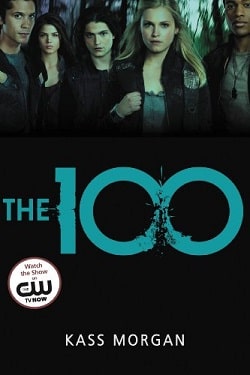Summary

The 100 (The 100 1)
by Kass Morgan
No one has set foot on Earth in centuries—until now.
Ever since a devastating nuclear war, humanity has lived on spaceships far above Earth's radioactive surface. Now, one hundred juvenile delinquents—considered expendable by society—are being sent on a dangerous mission: to recolonize the planet. It could be their second chance at life...or it could be a suicide mission.
CLARKE was arrested for treason, though she's haunted by the memory of what she really did. WELLS, the chancellor's son, came to Earth for the girl he loves—but will she ever forgive him? Reckless BELLAMY fought his way onto the transport pod to protect his sister, the other half of the only pair of siblings in the universe. And GLASS managed to escape back onto the ship, only to find that life there is just as dangerous as she feared it would be on Earth.
Confronted with a savage land and haunted by secrets from their pasts, the hundred must fight to survive. They were never meant to be heroes, but they may be mankind's last hope.
.
Read
The 100 (The 100 1) on http://kissnovel.net
Martial Peak Reviews
Kass Morgan's The 100 is a compelling blend of science fiction and dystopian drama that captures the imagination with its intriguing premise and complex characters. Set in a future where Earth has been rendered uninhabitable due to a catastrophic nuclear war, humanity's remnants have taken refuge in a fleet of interconnected spaceships orbiting the planet. The novel explores themes of survival, redemption, and the enduring human spirit through the eyes of one hundred juvenile delinquents sent back to Earth on a mission that could either be their salvation or their doom.
The narrative unfolds through the perspectives of four main characters: Clarke, Wells, Bellamy, and Glass. Each character brings a unique viewpoint to the story, enriching the plot with their personal struggles and motivations. Clarke is a strong, intelligent protagonist who grapples with the guilt of her past actions. Her journey is one of self-discovery and redemption, as she seeks to reconcile her past with her present circumstances. Wells, the chancellor's son, is driven by love and loyalty, having followed Clarke to Earth in hopes of winning back her trust. His character arc is a poignant exploration of sacrifice and the lengths one will go to for love.
Bellamy is the quintessential rebel, whose fierce determination to protect his sister Octavia adds a layer of familial devotion to the narrative. His character embodies the theme of survival at all costs, and his interactions with the other delinquents highlight the complexities of leadership and responsibility. Glass, who remains on the spaceship, provides a contrasting perspective to the Earth-bound narrative. Her storyline delves into the societal hierarchies and dangers that persist in space, offering a broader view of the challenges faced by humanity.
One of the novel's strengths lies in its exploration of themes that resonate deeply with readers. The concept of second chances is central to the story, as the hundred delinquents are given an opportunity to start anew on Earth. This theme is mirrored in the characters' personal journeys, as they confront their past mistakes and strive for redemption. The novel also tackles the idea of identity and how it is shaped by one's environment and experiences. As the characters navigate the harsh realities of their new world, they are forced to redefine themselves and their roles within the group.
The setting of a post-apocalyptic Earth serves as a powerful backdrop for the story, emphasizing the fragility of human civilization and the resilience required to rebuild it. Morgan's depiction of the planet as both a place of danger and potential is evocative, capturing the duality of hope and despair that permeates the narrative. The author skillfully balances the tension between the characters' internal conflicts and the external threats they face, creating a gripping and immersive reading experience.
In terms of character development, Morgan excels at crafting multidimensional characters who evolve over the course of the novel. Clarke's transformation from a guilt-ridden prisoner to a determined leader is particularly compelling, as is Wells' journey from privileged son to selfless protector. Bellamy's growth is marked by his increasing acceptance of responsibility, while Glass' story highlights the enduring power of love and loyalty in the face of adversity. The interactions between these characters are nuanced and realistic, adding depth to the narrative and enhancing the emotional impact of the story.
Comparatively, The 100 shares thematic similarities with other dystopian works such as Suzanne Collins' The Hunger Games and Veronica Roth's Divergent series. Like these novels, Morgan's work explores the dynamics of power, survival, and identity in a world where societal norms have been upended. However, The 100 distinguishes itself through its unique premise of space-bound humanity returning to a ravaged Earth, offering a fresh perspective on the genre.
Overall, The 100 is a thought-provoking and engaging read that will appeal to fans of dystopian fiction and character-driven narratives. Kass Morgan's ability to weave together complex themes, compelling characters, and a richly imagined world results in a novel that is both entertaining and meaningful. The book's exploration of human resilience and the quest for redemption resonates long after the final page is turned, making it a standout addition to the genre.
For those interested in exploring a story that combines the thrill of survival with the depth of character exploration, The 100 is a must-read. Its blend of action, emotion, and philosophical inquiry ensures that it will captivate readers and leave them eagerly anticipating the next installment in the series.
























Reviews 0
Post a Reviews: